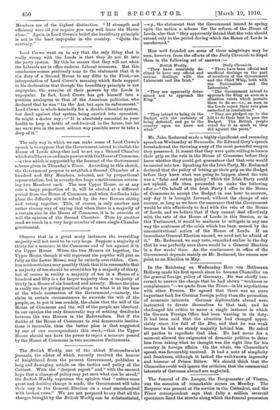Observe that in a great many instances the overriding majority
will not need to be very large. Suppose a majority of thirty for a measure in the Commons and of ten against it in the Upper House. When the two Houses sit together, the Upper House, though it will represent the popular will just as fully as the Lower House, may be entirely overridden. Care- less arithmeticians may possibly think that it is reasonable that a majority of ten should be overridden by a majority of thirty, but of course in reality a majority of ten in a House of a hundred and fifty is a far larger majority than a majority of thirty in a House of six hundred and seventy. Hence the plan is really one for giving practical shape to what is at the base of the whole contention of the Government,—namely, the claim in certain circumstances to override the will of the people, or, to put it less crudely, the claim that the will of the House of Commons and the will of the people are identical. In our opinion the only democratic way of settling deadlocks between the two Houses is the Referendum. But if the dislike of the House of Commons to real democratic institu- tions is incurable, then the better plan is that suggested by one of our correspondents this week,—that the Upper House should not have the power to reject a measure passed by the House of Commons in two successive Parliaments.










































 Previous page
Previous page